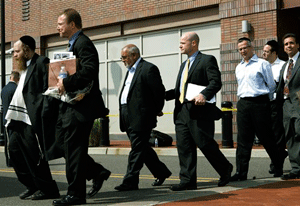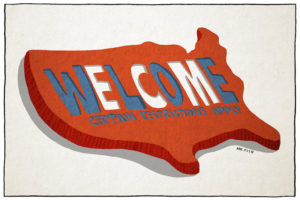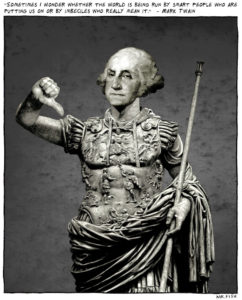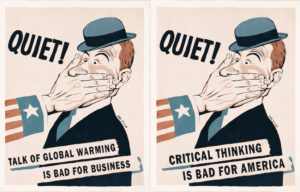American Plutocracy: Corruption Is In the Eye of the Beholder
To many observers, the recent New Jersey corruption sting, which resulted in the arrests of three mayors, two state assemblymen and five rabbis, seems rather surreal for the American social and political fabric.
Editor’s note: This article was originally published on The Huffington Post.
To many observers, the recent New Jersey corruption sting, which resulted in the arrests of three mayors, two state assemblymen and five rabbis, seems rather surreal for the American social and political fabric. Most of the charges involve bribery or money laundering, but included on the docket are also more sinister deeds, namely organ smuggling.
Corruption, it seems, is in the eye of the beholder. In other parts of the globe, it is boastfully blatant. People do not only accept graft as a reality of dealing with public officials, they expect it. In other regions such realities are sequestered to the shadows, but maintain an equally pernicious grip on the respective government and society. And in yet other societies, the corruption hides in plain sight. For, while some publics are well attuned to corruption in their government, others are blissfully and naively unaware.
Transparency International (TI), the international community’s foremost corruption watchdog, compiles a global Corruption Perception Index every year wherein a variety of “yes-no” questions are posed to respondents from 180 different countries. The results are telling, and they lead to TI’s overall corruption rank for each state, the last available of which draws from the 2008 index.
In Finland, which happens to have a country rank of 5 on the index, 69 percent of respondents consider it a bribe when a shopkeeper drops cash into a tipping box after a public official has granted him a license. In Croatia, the rate is 77 percent; in Pakistan, it’s 51 percent. And in the United States, which ranks 18th (tied with Japan), the rate of respondents is 52 percent.
Another scenario reads: “To ask someone else to help get the license and months later deliver a gift to the office annual party: Was the shopkeeper’s behavior acceptable?” In Turkey, only 11 percent of respondents think so, while in neighboring Armenia the rate soars vertiginously to 47 percent. In Venezuela, the rate is 7 percent, while in the United States it is 25 percent.
Needless to say, the public’s perception of corruption in its respective government is in stark variance throughout the world, even sometimes within regions and among neighbors. TI defines corruption as “the misuse of entrusted power for private gain.” This definition then breaks down into “according to rule” corruption and “against the rule” corruption, wherein “facilitation payments, where a bribe is paid to receive preferential treatment for something that the bribe receiver is required to do by law, constitute the former.”
According to a New York Times report earlier this year, someone who wants to safely traverse the roads of Afghanistan with a convoy of trucks must pay police officials $6,000, lest they tip off the Taliban. One may also buy off a judge for around $25,000; or get out of jail for $4,000. There are even reports of bribes being required for one to enter the airport or to have his electricity turned on.
TI’s corruption barometer found that in Europe, Latin America and sub-Saharan Africa, political parties are perceived to be most conducive to corruption. In Asia, the Middle East, North Africa and the Western Balkans, suspicions lie with the civil service. And in North America, it is the parliament or legislature.
Most police officers in America do not require greased palms for their services. But if one wishes to attend a chicken cordon bleu dinner with Sen. Max Baucus of Montana, it will cost him $10,000 (fly fishing and camping in Big Sky Montana with the same gentleman only costs a quarter of that though). Congressman Joe Crowley’s company, however, may be purchased for a piffling $100, including karaoke—unless one wishes to buy in bulk and also attend a “VIP After Party,” in which case the bill rises to $1,000.
The going rate for lunch with Congresswoman Suzanne Kosmas seems to be around $500, as is also the price for a savory “Taste of Michigan” luncheon with Congressman Bart Stupak. And for those who feel like splurging, a seat at the “Healthcare Community Dinner Honoring Pete Stark” will set one back a modest $2,500.
Charlie Palmer steaks and health-care talk with Republican Sens. Chuck Grassley, Mike Enzi and Richard Burr costs either $2,000 or $5,000, depending on one’s desired propinquity to the head of the table.
Just as it goes without saying for the traveler entering an airport in Afghanistan, so it goes in Washington, D.C. (or as former Rep. Charles W. Stenholm tells The Washington Post: “it’s normal politics”). While members of the former are pilloried as abject reprobates, the latter cunningly invoke the “democratic process”— the freedom to speak and the right to buy ears. But are the two really so different?
Granted, none of this is new, nor is it as depraved as black market organ trafficking. But its stench does begin to sting the nostrils ever so much more when crucial legislation is afoot, as it is now.
Has the $787,641 to Max Baucus’ coffers (and, to be fair, he is but one of 535) from the health professionals industry since 2005 played any role in his shaping health-care reform legislation? Nobody can say for sure—presumably not even Max Baucus. But insofar as public perception is concerned, Congress does not enjoy the benefit of the doubt—it suffers its detriment.
Such is also the case for conservative Blue Dog Democrats in the House, such as Mike Ross of Arkansas, who just days after voicing his criticism of the progressively minded health-care bills was wooed with extravagant fundraisers by health-care industry lobbyists. The 25 percent more in contributions that Blue Dogs receive from the health-care and insurance industries does not mean causation, but it is surely correlative.
And indeed, the fundraising flurry during health-care reform has been legion, but it is in no way sui generis. The $500 lunches are a Washington staple, as is purchasing a provincial police chiefdom in Afghanistan ($100,000). It is no doubt a problem that hides in plain sight, and those in a position to rectify it are the very same people who benefit from it.
Another issue though—and the one with real agency—is public perception, which remains hopelessly lost, like a child who wanders into the middle of a movie and wants to know what’s going on.
The nature of the American plutocracy will come fully to light as the current administration attempts to implement its agenda; and it seems only prudent to ask if money will finally walk while the majority talks. Given the current state of things, and the health-care reform concessions in both chambers this past week, a prudent answer to that prudent question is probably: Don’t count on it.
Your support matters…Independent journalism is under threat and overshadowed by heavily funded mainstream media.
You can help level the playing field. Become a member.
Your tax-deductible contribution keeps us digging beneath the headlines to give you thought-provoking, investigative reporting and analysis that unearths what's really happening- without compromise.
Give today to support our courageous, independent journalists.








You need to be a supporter to comment.
There are currently no responses to this article.
Be the first to respond.